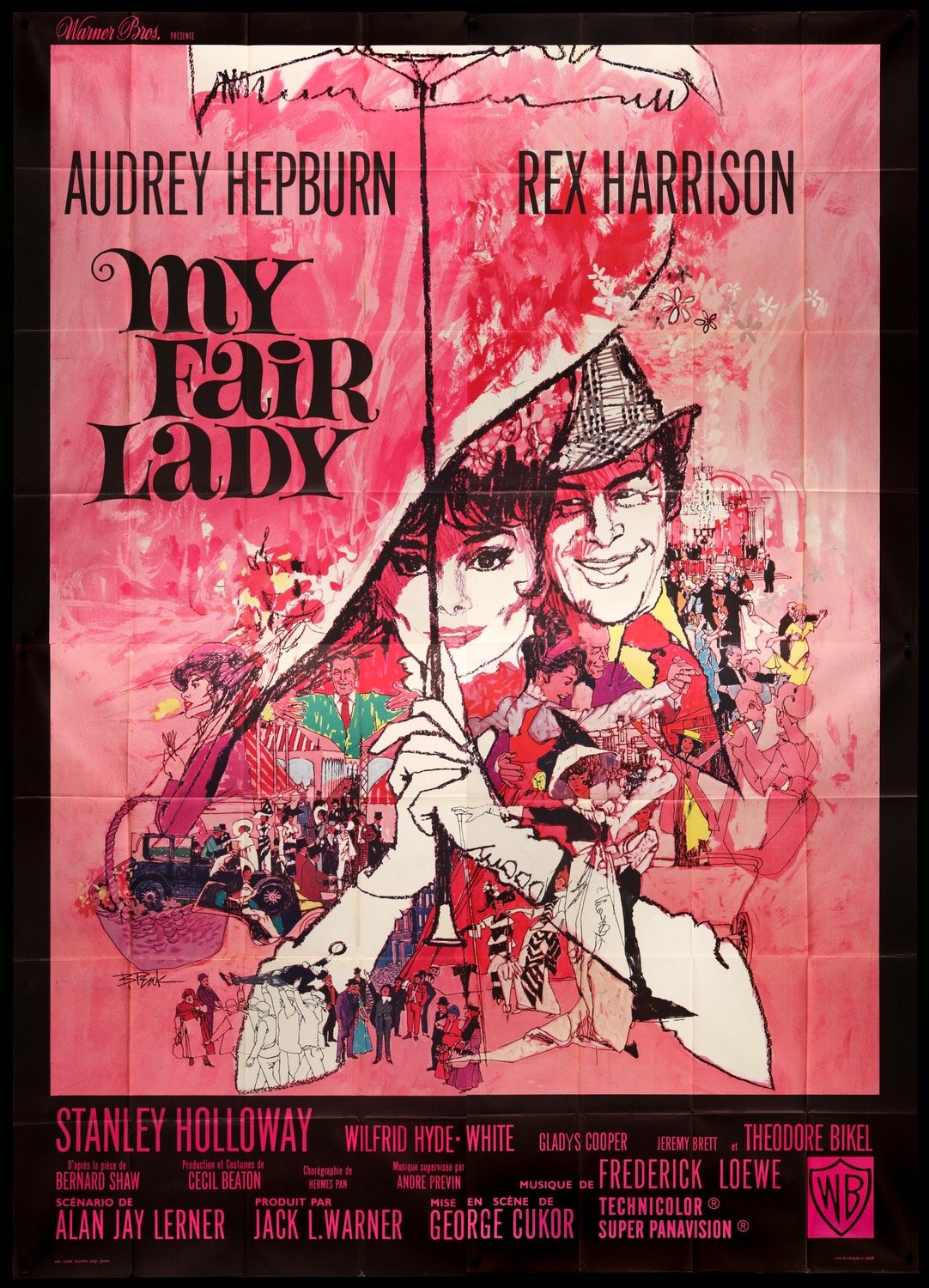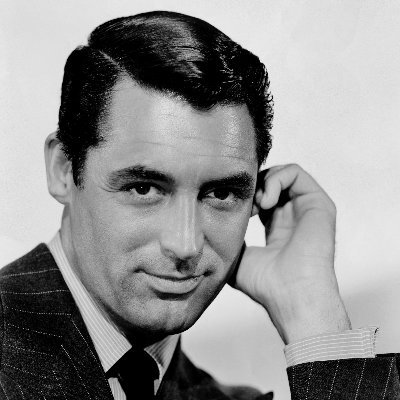
- Starring
- Audrey Hepburn, Rex Harrison, Stanley Holloway
- Writer
- Alan Jay Lerner
- Director
- George Cukor
- Rating
- n/a
- Running Time
- 170 minutes
Overall Score
Rating Summary
Has one ever seen such a solid foundation tragically wasted, with so many strange questionable decisions made in the course of a badly-paced two hours and fifty minutes? This 1964 adaptation of the Lerner and Loewe musical, My Fair Lady, delivers that experience and may even leave viewers faintly horrified at some of its conceits. Considering that the Pygmalion story has been used to great effect in previous adaptations and interpretations, this movie simply fails and emphasizes the worst aspects of George Bernard Shaw’s iconic source material
My Fair Lady sees the arrogant phonetics professor Henry Higgins (Harrison) brag to fellow phonetics professor Colonel Hugh Pickering (Wilfrid Hyde-White) that he can train any woman into becoming a high-class society figure. To that end of the bet, he takes poor Cockney flower seller Eliza Doolittle (Hepburn) as a client. Doolittle aspires to be work in a flower shop, but her strong Cockney accent makes that impossible. However within the first couple of minutes, one can’t help but notice that things are off. This starts when Hepburn starts speaking in her “Cockney” accent as Eliza. Hepburn has proven her talents in classics like Roman Holiday, Breakfast at Tiffany’s and plenty other of her well-known films, but she is simply miscast and misdirected as Doolittle. She is constantly hammy and over-affected, and her attempt at a Cockney accent is terrible. Her screeching becomes exhausting in a short period of time and her over-exaggerated expressions almost feel like they belong in a silent movie in how over-compensatory they are.
It feels odd to say that the best part of Hepburn’s performance is her singing – that didn’t even make it into My Fair Lady. Instead, her singing voice is dubbed over by Marni Nixon, whose voice sounds notably different from Hepburn’s. Frankly, they should’ve just kept Hepburn’s actual singing in place – Nixon might be the better singer, but Hepburn strikes the tone in those songs more convincingly and it somehow sounds more natural coming from her. Harrison meanwhile is just plainly unpleasant as Higgins. Yes, he’s playing a by-design unpleasant character, but you should get a sense of him growing and developing as the story resolves, and Harrison’s performance ensures one never gets a sense of any real character development from him. Many have criticized his speak-singing schtick but to my understanding that was an intentional choice that originated from the stage adaptation.
To be honest, this is the least of the problems with Harrison’s performance. The imbalanced dynamic between Doolittle and Higgins is often unsettling, and due to the lack of chemistry between Hepburn and Harrison, it’s hard to understand why Doolittle would put up with a man like Higgins. Harrison was reportedly quite the unsavory person in real life, and honestly, that translates to his performance. And when the film asks viewers to feel sympathy for him, it just doesn’t work or ring true in the slightest. Not that it would’ve made all its problems go away, but imagine casting someone like James Mason who could’ve imbued Higgins with charm and a little bit of empathy. If there are any actors who spare themselves in this mess, Stanley Holloway is gruff and over-the-top but a welcome and enjoyable presence as Eliza Doolittle’s father, and Gladys Cooper is fine enough in the maybe ten minutes she has on screen as Higgins’ disapproving mother.
A big problem with My Fair Lady is that it feels like a highly polished filmed stage play instead of actual cinema. The rain looks as if it’s being dispersed by sprinklers from up above, the production design and sets look awkward, artificial and cardboard, as if they are props about to fall down, and the cinematography is disappointingly flat for a cinematographer of Harry Stradling’s skill. Looking at films like West Side Story or Mary Poppins, both are musicals that used the film medium to become expressions in and of themselves, capitalizing on the potential for striking visuals, glorious choreography, and stunning production values. Compared to films like Who’s Afraid of Virginia Woolf and Hamlet, films that transcended their stage roots and made great use of cinematic language, this one fell very short. And the nearly two hour and fifty minute runtime makes it feel like an endurance test due to editing that doesn’t even try to justify such a hefty length for a plot that’s not complicated or complex enough to justify it. It’s a shame that this is the film that earned George Cukor his Oscar, instead of his countless classics like Little Women, Dinner at Eight, The Philadelphia Story, Holiday, or A Star Is Born. The only element of this film that feels like it’s coming from a big-budget 1964 film was the costumes, which are snazzy, colorful, and match the narrative of Eliza’s Cinderella-like transformation from poor Cockney girl to elegant high-class lady. Cecil Beaton knew the assignment and spared no expense.
But what about the songs? After all, isn’t that what you go into any musical for? Well, “Wouldn’t It Be Loverly?” and “The Rain In Spain” are the clear standouts of My Fair Lady, there are some interesting melodic choices in “Poor Professor Higgins” but otherwise the songs begin to bleed into one another and feel interchangeable with other musicals from this era. Maybe it’s just that the film doesn’t do the individual songs any justice, but this aspect was really disappointing.
Going back to the unbalanced dynamic between Doolittle and Higgins, one feels as if there is meant to be commentary on gender roles and sexism, that it should want to take Higgins down a peg, but it never goes along with it. Instead it seems to have Doolittle subtly fall in love with him without us actually understanding why or how. It’s actually somewhat disturbing how much it gives a pass to Higgins’ often repugnant behavior. Comparatively, the 1938 version of Pygmalion actually forces Higgins to overcome his prejudices and change his views and understandings of the world around him, including having to change to become worthy of Eliza. That film is also smart in how it handles the vague ending with Henry and Eliza.
In the end, it’s hard to see this film as anything but a downgrade given all the talent involved. Though the original stage version surely has a lot of merits, My Fair Lady in no way represents that. Viewers should do themselves a favor and rewatch Mary Poppins. or even the 1938 Pygmalion.
still courtesy of Paramount Pictures
Follow me on Twitter, Instagram, and Letterboxd.
If you liked this, please read our other reviews here and don’t forget to follow us on Twitter or Instagram or like us on Facebook.
Discover more from
Subscribe to get the latest posts sent to your email.

